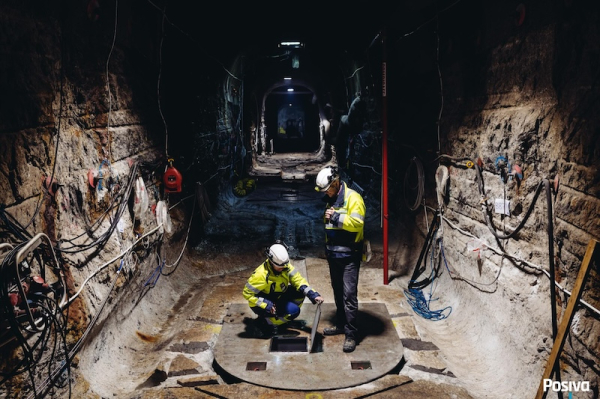
The Onkalo repository. Photo: Posiva Oy
- Next Article Finnish pension funds among top performers in global investment ranking
Finland is set to become the first country to permanently dispose of nuclear waste underground after a successful trial run at its encapsulation facility in March. The Onkalo repository, located on the country’s west coast near the town of Eurajoki, has passed a key milestone toward becoming the world’s first operational deep geological repository for radioactive waste.
The test saw five non-radioactive containers sealed above ground before being placed in a 70-metre tunnel 430 metres below the surface.
The encapsulation process involved placing spent fuel rods into copper canisters, which are then embedded into granite and surrounded by bentonite clay. This combination is intended to insulate the waste from geological shifts and prevent leaks for millennia.
The facility, operated by Posiva Oy, was founded in 1995 by Finland’s nuclear power firms to solve the problem of long-term storage. The repository is intended to receive spent fuel from the country’s five operating reactors located at Olkiluoto and Loviisa. Construction has already cost €900 million, with a further €4 billion needed to complete the project.
Globally, nuclear power has generated approximately 430,000 metric tonnes of spent fuel since the 1950s. About 70 percent of this fuel remains in temporary storage facilities with no permanent disposal solution. Finland’s Onkalo project is now at the forefront of global efforts to address this challenge.
“Despite decades of debate, no country has yet completed a deep geological repository. Finland is closest to the finish line,” said Liaison Manager Mika Vidlund of the Finnish Centre for Pensions, commenting on the international significance of the development.
While Finland has moved closer to operational status, other countries are pursuing similar plans. Sweden has received the necessary environmental permits for a repository that will store 12,000 metric tonnes of waste beneath 60 kilometres of tunnel at a depth of 500 metres. Construction is expected to begin within a decade and could take until the 2080s to complete, pending ongoing legal appeals.
Canada is also preparing a facility near Ignace, Ontario, after a lengthy consultation process with local communities, including the Wabigoon Lake Ojibway Nation. France, Switzerland, and Italy continue to develop their own projects but remain years or decades from operation.
In Finland, some local residents and scientists have raised concerns over long-term risks, including corrosion of copper canisters. A 2023 study by corrosion experts at KTH Royal Institute of Technology in Sweden warned that sulfides in groundwater may accelerate canister degradation, potentially leading to radiation leakage.
Despite the concerns, Finland’s regulatory and political processes have enabled steady progress. The encapsulation test completed in March marks a critical validation of the repository’s operating procedures. If final permits are granted and safety benchmarks are met, Onkalo could begin accepting real nuclear waste within the next few years.
The Finnish government and Posiva Oy say the system is designed to isolate radioactive materials safely for up to 100,000 years, with safeguards in place to withstand both natural disasters and future geological changes.
Countries investing in AI infrastructure and low-carbon energy are showing renewed interest in nuclear power. This shift has increased global attention on how to manage nuclear waste responsibly. Finland’s approach could serve as a model.
With permanent storage infrastructure nearly complete, Finland is positioned to lead global nuclear waste policy, and to offer an answer to one of the most pressing unsolved challenges of the nuclear age.
HT
- Next Article Finnish pension funds among top performers in global investment ranking
Source: www.helsinkitimes.fi
